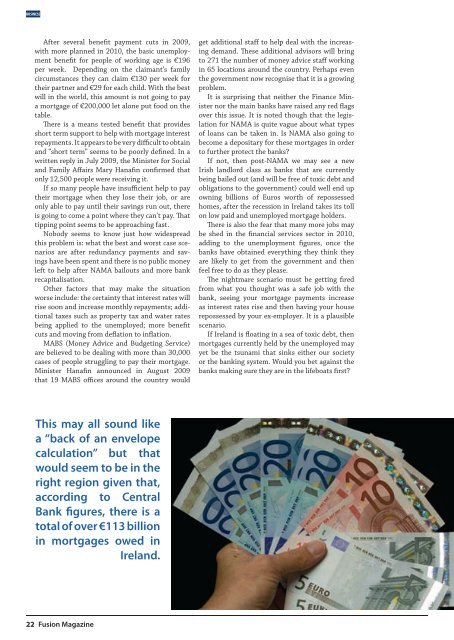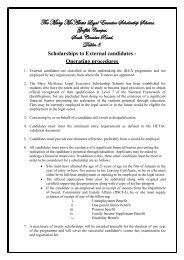Click here to View - Griffith College Dublin
Click here to View - Griffith College Dublin
Click here to View - Griffith College Dublin
- No tags were found...
Create successful ePaper yourself
Turn your PDF publications into a flip-book with our unique Google optimized e-Paper software.
usinessAfter several benefit payment cuts in 2009,with more planned in 2010, the basic unemploymentbenefit for people of working age is €196per week. Depending on the claimant’s familycircumstances they can claim €130 per week fortheir partner and €29 for each child. With the bestwill in the world, this amount is not going <strong>to</strong> paya mortgage of €200,000 let alone put food on thetable.T<strong>here</strong> is a means tested benefit that providesshort term support <strong>to</strong> help with mortgage interestrepayments. It appears <strong>to</strong> be very difficult <strong>to</strong> obtainand “short term” seems <strong>to</strong> be poorly defined. In awritten reply in July 2009, the Minister for Socialand Family Affairs Mary Hanafin confirmed tha<strong>to</strong>nly 12,500 people were receiving it.If so many people have insufficient help <strong>to</strong> paytheir mortgage when they lose their job, or areonly able <strong>to</strong> pay until their savings run out, t<strong>here</strong>is going <strong>to</strong> come a point w<strong>here</strong> they can’t pay. Thattipping point seems <strong>to</strong> be approaching fast.Nobody seems <strong>to</strong> know just how widespreadthis problem is: what the best and worst case scenariosare after redundancy payments and savingshave been spent and t<strong>here</strong> is no public moneyleft <strong>to</strong> help after NAMA bailouts and more bankrecapitalisation.Other fac<strong>to</strong>rs that may make the situationworse include: the certainty that interest rates willrise soon and increase monthly repayments; additionaltaxes such as property tax and water ratesbeing applied <strong>to</strong> the unemployed; more benefitcuts and moving from deflation <strong>to</strong> inflation.MABS (Money Advice and Budgeting Service)are believed <strong>to</strong> be dealing with more than 30,000cases of people struggling <strong>to</strong> pay their mortgage.Minister Hanafin announced in August 2009that 19 MABS offices around the country wouldget additional staff <strong>to</strong> help deal with the increasingdemand. These additional advisors will bring<strong>to</strong> 271 the number of money advice staff workingin 65 locations around the country. Perhaps eventhe government now recognise that it is a growingproblem.It is surprising that neither the Finance Ministernor the main banks have raised any red flagsover this issue. It is noted though that the legislationfor NAMA is quite vague about what typesof loans can be taken in. Is NAMA also going <strong>to</strong>become a depositary for these mortgages in order<strong>to</strong> further protect the banks?If not, then post-NAMA we may see a newIrish landlord class as banks that are currentlybeing bailed out (and will be free of <strong>to</strong>xic debt andobligations <strong>to</strong> the government) could well end upowning billions of Euros worth of repossessedhomes, after the recession in Ireland takes its <strong>to</strong>llon low paid and unemployed mortgage holders.T<strong>here</strong> is also the fear that many more jobs maybe shed in the financial services sec<strong>to</strong>r in 2010,adding <strong>to</strong> the unemployment figures, once thebanks have obtained everything they think theyare likely <strong>to</strong> get from the government and thenfeel free <strong>to</strong> do as they please.The nightmare scenario must be getting firedfrom what you thought was a safe job with thebank, seeing your mortgage payments increaseas interest rates rise and then having your houserepossessed by your ex-employer. It is a plausiblescenario.If Ireland is floating in a sea of <strong>to</strong>xic debt, thenmortgages currently held by the unemployed mayyet be the tsunami that sinks either our societyor the banking system. Would you bet against thebanks making sure they are in the lifeboats first?This may all sound likea “back of an envelopecalculation” but thatwould seem <strong>to</strong> be in theright region given that,according <strong>to</strong> CentralBank figures, t<strong>here</strong> is a<strong>to</strong>tal of over €113 billionin mortgages owed inIreland.22 Fusion Magazine
















